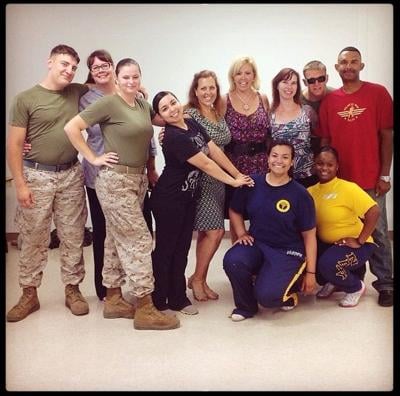Helping our Military Through Salsa Dancing
While it was common to see WWII servicemen and women dancing on the eve of their deployment, or in celebration of the end of the war, that now seems to belong to a military era long gone by. However, Soldiers Who Salsa (SWS) is working to change that on a national level. The non-profit organization seeks to help retired and active duty service members and their families through therapeutic salsa dancing.
SWS started at Naval Medical Center San Diego (NMCSD) in 2010 when a dedicated physical therapist began teaching salsa to patients with prosthetic limbs at a lunchtime clinic. Within weeks, the physical therapists recognized the potential for dancing to help patients with PTSD (post-traumatic stress disorder) and TBI (traumatic brain injury), as well as limb loss. As the class size grew, it became clear that a professional instructor was needed, and Jennifer Ables, now the Executive Director of SWS, was brought in. "I wanted to do anything to help wounded warriors," Ables said in a recent interview with Bob Lawrence on ABC 10. "If I could somehow combine my dance background with helping veterans, I mean, I couldn’t imagine a more dream job."
With the huge success at NMCSD, Ables took the program a little further north to Naval Hospital Camp Pendleton in late 2011, and then to the East Coast in 2012 at the Walter Reed National Military Medical Center. In the fall of 2013, classes began in Texas at the San Antonio Military Medical Center. Classes are taught only at military medical facilities, and are typically provided through a therapy program. Patients with prosthetic limbs are able to work on coordination and balance through the program, while patients with TBI have improved memory recall and performance of multi-function activities. Salsa dance has also proven invaluable to patients with PTS/PTSD, because aversion to close contact, avoidance of new activities and new surroundings, and reluctance to meet new people are all common symptoms of PTS/PTSD.
An important aspect of SWS is that it is a physical therapy program that not only allows, but encourages family members to get involved. "This has been the best day," wrote the wife of one patient. "We haven’t danced together since our wedding. For all his other appointments I sit and read as I wait for him, so to be able to do this with him was amazing." Participants have often come with their spouses and even with their daughters and sons on occasion.
As a 501(c)(3) organization, SWS provides all of its programs at no cost to the patient, and is completely funded by donations and grants. To learn more about how you can help, financially or by volunteering, please visit www.soldierswhosalsa.org/support.


(0) comments
We welcome your comments
Log In
Post a comment as Guest
Keep it Clean. Please avoid obscene, vulgar, lewd, racist or sexually-oriented language.
PLEASE TURN OFF YOUR CAPS LOCK.
Don't Threaten. Threats of harming another person will not be tolerated.
Be Truthful. Don't knowingly lie about anyone or anything.
Be Nice. No racism, sexism or any sort of -ism that is degrading to another person.
Be Proactive. Use the 'Report' link on each comment to let us know of abusive posts.
Share with Us. We'd love to hear eyewitness accounts, the history behind an article.